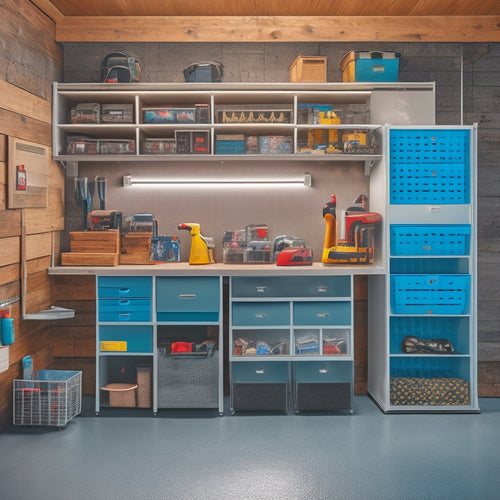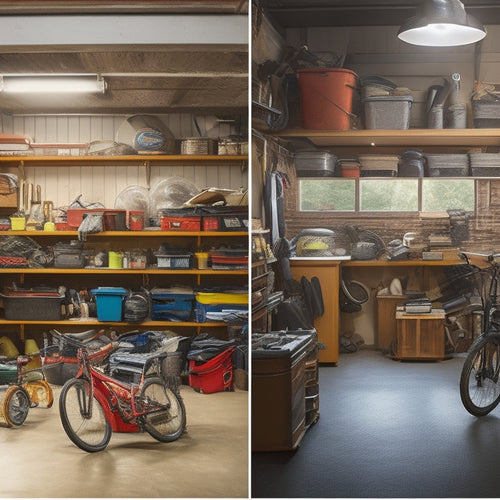
Revolutionize Learning Through Play With Kitchen Units
Share
Kitchen units have emerged as a powerful catalyst for revolutionizing learning in early childhood education, offering a unique platform for play-based learning that fosters cognitive, social, and emotional development in young children. Through role-playing and sensory experiences, children develop essential skills like problem-solving, fine motor control, and social interaction. By incorporating kitchen units into their learning environment, educators can create a dynamic space that sparks curiosity and imagination. As we explore the intersection of play and learning, we discover the boundless potential of kitchen units to transform the way children grow and develop - and there's still so much to uncover.
Key Takeaways
• Kitchen units in early childhood education offer sensory experiences, promoting social interaction, fine motor skills, and cognitive development.
• Play-based learning with kitchen units fosters curiosity, imagination, and independence, as children explore and learn through trial and error.
• Everyday moments at home can become opportunities for growth and discovery, nurturing children's natural desire to learn and explore.
• Kitchen units serve as hubs for experimentation, encouraging children to take ownership of their learning and develop problem-solving skills.
• By incorporating kitchen units into play-based learning, educators can create a dynamic environment that revolutionizes the way children learn and develop.
Kitchen Units as Learning Tools
By incorporating kitchen units into early childhood education, educators can revolutionize learning through play, providing a unique platform for children to explore, experiment, and learn essential skills in a fun and engaging manner.
These units offer a treasure trove of sensory experiences, allowing children to explore textures, from smooth countertops to rough wooden utensils. Role-playing scenarios, such as preparing meals or running a pretend café, encourage social interaction, problem-solving, and creativity.
As children engage with kitchen units, they develop their fine motor skills, hand-eye coordination, and cognitive abilities. By embracing this innovative approach, educators can create a dynamic learning environment that fosters curiosity, imagination, and a love for learning.
Play-Based Learning in Action
As kitchen units come alive with the sights, sounds, and aromas of imaginative play, educators can observe firsthand how play-based learning unfolds in a dynamic, child-centered environment. Here, children are free to explore textures, from the smoothness of countertops to the roughness of wooden utensils, fostering sensory development.
As they take on roles, they're encouraged to make decisions, solving problems and developing independence. The kitchen unit becomes a hub of activity, where children can experiment, create, and learn through trial and error.
Nurturing Curiosity at Home
In harmony with the play-based learning approach, parents and caregivers can extend the spirit of curiosity and exploration into the home environment, where everyday moments become opportunities for growth and discovery. By incorporating hands-on exploration and sensory experiences, like play-based kitchen units, children can engage in imaginative role-playing, developing essential social skills.
This approach encourages children to take ownership of their learning, fostering independence and creativity. By embracing curiosity at home, parents can create a nurturing environment that supports their child's natural desire to learn and explore. By doing so, they'll be raising curious, confident, and creative thinkers who are ready to take on the world!
Frequently Asked Questions
How Do I Balance Structured and Unstructured Play in My Kitchen Unit Setup?
When balancing structured and unstructured play, establish clear play routines and learning boundaries to foster autonomy while maintaining guidance, allowing children to explore freely while staying on track, and making the most of their kitchen unit adventures!
Can I Adapt Kitchen Units for Children With Special Needs or Disabilities?
When designing play spaces for children with special needs, incorporate accessible design principles and sensory integration elements to create an inclusive environment that fosters exploration, creativity, and social interaction, ensuring every child can fully engage and thrive.
What Safety Measures Should I Take When Introducing Water Play and Risky Play?
As we explore the world of water play and risky ventures, remember that safety is the anchor that holds the ship of learning afloat. Mitigate water hazards with vigilant supervision strategies, ensuring a splash of fun without a drop of danger.
How Can I Involve Fathers and Other Male Caregivers in Play-Based Learning?
To boost Dad Engagement, invite male caregivers to co-lead play-based learning activities, fostering Male Mentors who inspire curiosity and creativity, while encouraging them to share their unique skills and interests with the children.
What Are Some Ways to Extend Kitchen Unit Learning to Outdoor and Natural Play?
Imagine a group of curious children on a Nature Scavenger hunt, collecting leaves and twigs to create a collaborative outdoor kitchen installation. To extend kitchen unit learning, create a Garden Harvest station where children can plant and tend to their own herbs, fostering a deeper connection with nature and the food cycle.
Related Posts
-

Organize Your Garage: Tool Storage Solutions Revealed
You're about to transform your cluttered garage into a highly efficient workspace by implementing a customized tool s...
-

Transform Your Cluttered Garage With Proven Systems
You're sitting on a cluttered garage's hidden potential, and by implementing the right combinations of strategies and...

